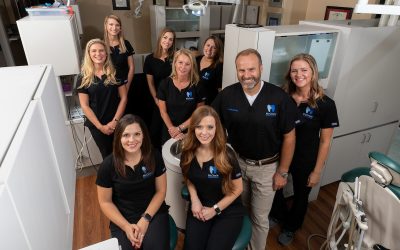MOST PEOPLE GRIND OR CLENCH their teeth briefly when annoyed or in a tense situation. That level of teeth-grinding isn’t really something to worry about. It’s when you do it far more frequently, often without even realizing it, (in fact most people do it in their sleep!), that it can potentially become a serious problem. The medical term for this kind of teeth-grinding is bruxism.
Bruxism: What and Why
Sleep bruxism (or nocturnal bruxism) can happen as a side-effect of snoring and sleep apnea, and awake bruxism (or diurnal bruxism) can happen as a side-effect of stress in your daily life. However, not everyone with a sleep disorder or a stressful life has bruxism, and not everyone with bruxism has a sleep disorder or a ton of stress. Another possible cause is improperly aligned teeth.
Because there isn’t one clear cause, treatment can sometimes be tricky, and the focus is often on the symptoms and minimizing the damage more than curing the underlying condition. Even if you aren’t aware that you’re grinding your teeth, any of the following symptoms could point to bruxism:
- Sore jaw (with sleep bruxism, your jaw will be most sore when you wake up, whereas with awake bruxism, it’ll be most sore before you go to bed)
- Frequent headaches from all the strain
- Hypertrophy in your jaw muscles (because you’re giving them quite the workout!)
- Shifting teeth
- Flattened chewing surfaces of teeth
- Exposed dentin and increased tooth sensitivity
- Chipped/cracked/split teeth
- Tooth loss
Your Next Steps If You Have Bruxism
Depending on which type of bruxism you have, there are a variety of treatments or approaches to either reduce the grinding or the damage it causes.
Behavioral Therapy
With behavioral therapy or habit-reversal techniques, you can become more aware of your clenching/grinding habits and consciously work to stop. This one works better when you have awake bruxism than sleep bruxism because it’s obviously much harder to control your jaw muscles in your sleep. Most of the time if you can figure out how to decrease your stress it will help to grind and clenching. Lower stress is better all-around but we can get more stressed trying to figure out how to get less stress, we know this is complicated.
Relaxation
Particularly for stress-related bruxism, relaxation techniques such as yoga, deep breathing exercises, massages, warm baths, calming music, and a full night’s sleep can help you de-stress and stop grinding.
Wearing A Mouthguard
A mouthguard or splint serves as a pillow between your upper and lower teeth. It protects your teeth from damage. Here at McOmie Family Dentistry, we see the success of mouthguards very high, Right at 90%. Most of our patients who wear mouthguards of some kind at night won’t sleep without them. They are great and can be comfortable and really help with bruxism. Sometimes people will stop grinding with this technique.
Prescription Medication Is A Last Resort
Muscle relaxant medication, as prescribed by Dr. McOmie, might help you unclench while you sleep. However, medicine is rarely used to treat bruxism, especially if other treatments are helping. We use this as a last resort because most often we can get the grinding or bruxism under control with nondrug methods. Remember ALL drugs have side effects they can interact with other medications and some can become habit-forming. We want to curb the grinding habit not start a new habit with medication.
What About Snoring And Sleep Apnea?
Dr. Mark, along with the rest of our team, are very experienced in this area. So much so that we want to devote an entire blog post just to this. We love treating sleep apnea helping people get off CPAP machines is one of our favorite things. We like to use the TAP 3 Elite appliance and use our Trios by 3 Shape scanner to make them. If Sleep Apnea and snoring is an area of interest for you keep your eye on our blog we promise a blog post is coming shortly.
Check out this video for more information and a few other ideas on how to combat bruxism or minimize the damage:
We Can Help!
If you’re experiencing any of the above symptoms, it may be due to bruxism and you should schedule an appointment so we can make a plan for how to address it. You don’t want to leave it untreated until it gets to the point where it’s damaging your teeth.




